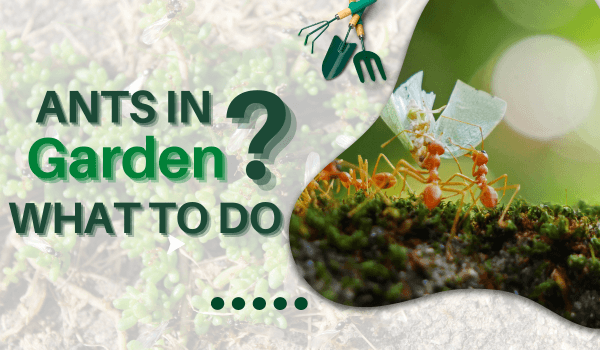If you are in a garden, you will always find ants roaming here and there. The garden has become their home default. However, there are many different aspects of the behavior of ants in the garden. There are some situations in which ants are also beneficial for the soil. Let us understand both the situations.
In pots and garden soil, ants often become a nuisance. This not only makes it difficult to handle the soil for planting but also poses a risk to the plants, as small visible ants can harm them. When mealybugs and aphids infest the garden, the ant population tends to increase. Removing mealybugs and aphids becomes challenging if they infest the pots or plants. During the hot summer months, the soil in pots and gardens usually remains dry, leading to a continuous increase in the ant population. In such cases, several measures must be taken to alleviate the problem.
Ways to Save Garden From Ants
Through Hot And Cold Water
If ants have established their colonies in the garden, water can be used to get rid of them. While water won’t necessarily kill the ants, it will make them move away. If the ants are near the plants, using cold water can be effective. However, if they are far from the plants in the garden, using warm water can help to drive them away. Additionally, creating barriers using substances like cinnamon, citrus oil, or diatomaceous earth can also deter ants from entering the garden or reaching the plants. Regularly cleaning up food scraps and debris, which attract ants, can also help prevent infestations.
Through the Solution of Oil And Soap
To create a solution, mix one tablespoon of liquid dishwashing soap with one and a half tablespoons of regular cooking oil. Apply this solution directly onto the ants and into their nests. Adopting this homemade remedy will ensure that no harm comes to the plants while effectively keeping ants away. The soap disrupts the ant’s ability to navigate, and the oil suffocates them, effectively deterring them from returning to the plants.
Through Lemon Juice
Lemon juice can be used as a natural spray to repel ants effectively. By mixing water and lemon juice in equal proportions, a solution can be created. This mixture can then be sprayed onto the areas affected by ants. The acidic nature of lemon juice disrupts the ant’s scent trails and communication, deterring them from returning to the treated areas. Additionally, the strong aroma of lemon acts as a natural repellent for ants and other pests. This eco-friendly approach not only helps in controlling ant infestations but also avoids the use of harmful chemicals.
Through Borax and Sugar
Adding a mixture of borax powder and sugar is one of the most effective methods for killing ants in the garden. This combination acts as a bait, attracting ants with the sweetness of sugar while the borax acts as a toxic agent. When ants consume this mixture and carry it back to their nests, it disrupts their digestive systems, ultimately leading to their demise. Within a week of using this method, you can effectively eliminate ants from your garden. It’s important to place this mixture strategically in areas where ants are commonly found, ensuring maximum exposure to the bait.
Through Combination of Vinegar and Water
Combining white vinegar with water to create a spray solution can also be effective in deterring ants from plants. The strong odor of vinegar acts as a natural repellent for ants, discouraging them from venturing near the sprayed areas. Additionally, vinegar disrupts the scent trails that ants use to communicate and navigate, further confusing and deterring them. Regularly spraying vinegar solution around the base of plants or areas where ants are commonly found can help create a barrier and prevent them from infesting your garden. This method is environmentally friendly and safe for plants, making it a convenient and natural way to manage ant infestations without resorting to harmful chemicals.
How Are Ants Important For The Garden
While ants are not entirely harmful, as they contribute to the breakdown of leaves, branches, and other organic matter, providing nutrients to plants, they can become problematic when they start causing damage to plants by disturbing roots or spreading diseases. Moreover, ants can protect and cultivate pests like aphids, mealybugs, and scale insects, which can harm plants by feeding on their sap or transmitting diseases. Therefore, it becomes crucial to manage ant populations in gardens to prevent potential damage to plants. Using natural methods like repellent sprays, barriers, or disrupting ant trails can help deter ants and protect plants without resorting to harmful chemicals, ensuring a healthy and thriving garden ecosystem.
Conclusion
This is the summary of the relationship of ants with the garden. In some situations, they are not good for the garden and in some situations, they are helpful towards it. Hope you have understood the effect of the presence of ants in the garden. Keep reading and keep the nature around us clean.
